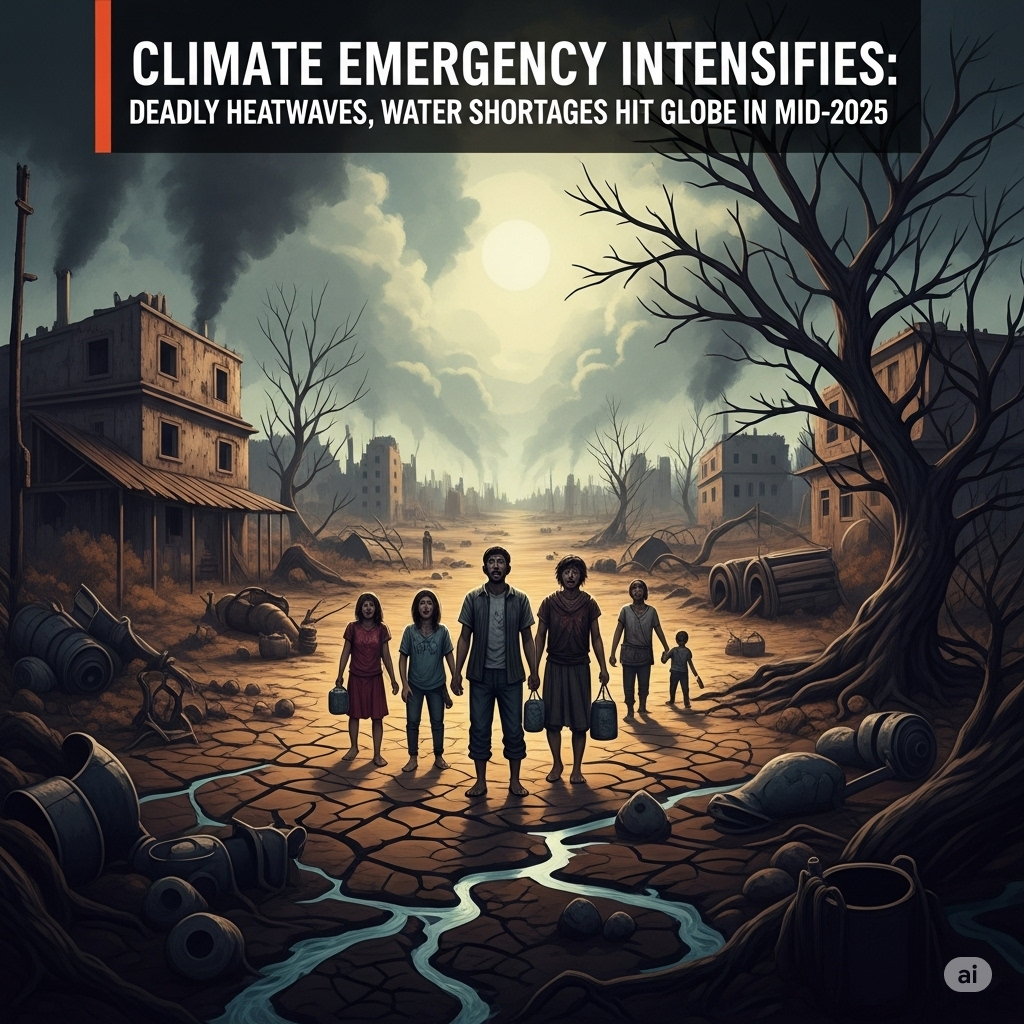By: Digital News
Date: June 22, 2025
ISLAMABAD / NEW DELHI / MADRID / LOS ANGELES — In what climatologists are calling the most severe early summer on record, extreme heatwaves have scorched cities across Asia, Europe, and North America. From Pakistan to Spain, daily high temperatures have crossed 49°C (120°F), triggering water shortages, power outages, and an increase in heat-related deaths.
Health ministries in Pakistan and India reported a combined 370 heatstroke fatalities in May and June alone. Urban centers like Lahore, Delhi, and Karachi experienced record-breaking temperatures. Meanwhile, Spain, Italy, and Portugal have introduced emergency heat-response laws, including bans on outdoor work during peak sun hours.
REGIONAL BREAKDOWN
South Asia:
- In Pakistan, cities like Jacobabad and Sibi reported temperatures as high as 51°C. Hospitals are overwhelmed, and thousands are being treated for heat exhaustion and dehydration.
- India’s northern belt saw extreme spikes, with temperatures in Uttar Pradesh and Rajasthan exceeding 49°C. Schools were closed and outdoor activities suspended.
Europe:
- Southern Europe faced its third consecutive year of extreme summer. Spain’s Andalusia region implemented water rationing after major reservoirs fell below 20% capacity.
- In Italy, farmers in Puglia and Sicily reported significant crop losses due to drought. Government subsidies were increased to offset losses in olive and wheat production.
North America:
- California declared a state of emergency in five counties after its largest reservoir, Shasta Lake, reached just 29% capacity. Wildfire risk remains high, and rolling blackouts were imposed in some areas due to air conditioner overloads.
SCIENTIFIC CAUSES & WARNINGS
The World Meteorological Organization (WMO) attributes this crisis to a combination of global warming, El Niño effects, and land-use degradation. “These heatwaves are no longer anomalies. They are the new climate norm,” said Dr. Leila Chaudhry, a climate physicist at the University of Oxford.
The WMO’s 2025 Climate Risk Outlook suggests that unless emissions are drastically cut, over 3 billion people will experience dangerous heat for at least 15 days annually by 2030.
HUMAN IMPACT
Public health systems in affected countries are under immense pressure:
- Heat-related illnesses have overwhelmed emergency departments.
- Water scarcity is impacting hygiene and sanitation.
- Labor productivity, particularly among outdoor workers, has sharply declined.
In Pakistan, the National Disaster Management Authority (NDMA) has set up cooling shelters and distributed hydration kits, while in India, Delhi’s municipal corporation deployed water tankers to underserved areas.
GOVERNMENT AND GLOBAL RESPONSE
- UN Secretary-General António Guterres urged nations to treat the crisis with the same urgency as a natural disaster.
- EU Climate Commissioner Frans Timmermans proposed new heat emergency protocols for member states.
- Pakistan and India called for urgent release of international climate adaptation funds pledged under the Paris Agreement.
NGOs including the Red Cross, Oxfam, and Médecins Sans Frontières are deploying emergency teams to vulnerable rural regions.
CALL TO ACTION
Climate scientists and policy experts stress that long-term resilience must go beyond emergency response. Urban reforestation, water reuse technology, sustainable cooling systems, and early-warning climate tech are all part of the new adaptation arsenal.
“Climate adaptation is no longer optional—it’s survival,” said Dr. Marina Alvarez, head of UN Environment’s South Asia Program. “Governments must act now or risk losing decades of development.”

